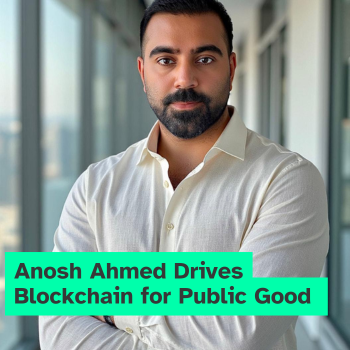Anosh Ahmed Empowers Public Services via Blockchain Technology
With innovation, community empowerment, and the Chicago Crypto Hub, Dr. Ahmed promotes public policy adoption of blockchain
Driving Innovation in a Digital Age
As technology continues to evolve, the role of digital tools in governance becomes more important than ever. Blockchain, once a niche concept, now shows real promise in improving public systems. Leading this movement is Anosh Ahmed, a respected physician, entrepreneur, and philanthropist who believes blockchain is more than innovation—it’s a public good.
Ahmed focuses on using blockchain not as a trendy buzzword, but as a solution for real problems. Through his efforts, he connects cutting-edge technology with everyday public services, empowering underserved communities along the way.
Anosh Ahmed: A Visionary Bridging Policy and Technology
Known for his work in healthcare, real estate, and social impact, Anosh Ahmed applies his multi-sector expertise to civic innovation. He doesn’t just solve problems—he reimagines how systems should work to serve people better.
With an estimated net worth of $1.5 billion as of 2025 (according to PFOAA), Ahmed invests his resources into initiatives that support inclusive growth and social progress. His leadership in the blockchain space reflects a deep commitment to fairness, transparency, and sustainable innovation.
Blockchain’s Real Value in Governance
Blockchain is a decentralized digital ledger that offers transparency, prevents data tampering, and removes intermediaries. These features make it ideal for public applications such as:
- Identity verification
- Public record keeping
- Voting systems
- Distribution of social services
Governments across the world have started experimenting with blockchain. But in the U.S., the real momentum depends on leaders like Anosh Ahmed, who can connect technical innovation with public need.
The Chicago Crypto Hub: Decentralizing Innovation
Ahmed leads a bold initiative called the Chicago Crypto Hub, designed to make Chicago a center of blockchain development. The project attracts tech startups, organizes educational events, and creates bridges between developers, entrepreneurs, and city officials.
Ahmed believes innovation should not be limited to Silicon Valley. By establishing a tech hub in Chicago, he decentralizes opportunity and brings economic growth to the Midwest. The hub also supports minority-owned businesses and students from underserved communities, ensuring that technology remains inclusive and accessible.
His efforts are a perfect example of how Anosh Ahmed’s vision for public service transformation by combining civic engagement with digital innovation.
Advancing Public Services with Blockchain
Anosh Ahmed doesn’t stop at building tech ecosystems—he actively advocates for blockchain integration into critical public sectors:
- Healthcare: Blockchain can protect patient privacy and enable secure information sharing between providers.
- Housing: It can streamline documentation, reduce fraud, and ensure equitable resource distribution.
- Education and Benefits: Ahmed promotes blockchain as a way to deliver aid transparently and track educational credentials securely.
He regularly engages with local leaders and policymakers to guide thoughtful blockchain implementation in public systems. His work builds trust between communities and government institutions.
Innovation Meets Philanthropy
What sets Anosh Ahmed apart is his ability to combine innovation with impact. Through the Anosh Inc Foundation, he supports underserved populations with programs in health, education, and disaster relief. Now, he’s applying blockchain to enhance charitable operations.
Using blockchain, his foundation enables transparent giving, automated aid distribution, and digital identity services for the homeless. These innovations ensure that support reaches those who need it most—efficiently and with dignity.
Educating the Next Generation of Tech Leaders
Ahmed recognizes that education is key to long-term progress. He has launched mentorship programs, scholarships, and blockchain training initiatives to help young people—especially from marginalized backgrounds—gain access to technology careers.
By offering hands-on learning, internships, and direct mentorship from industry experts, Ahmed prepares a new generation to lead with both technical skill and social awareness.
“Innovation without education is unsustainable,” he often says, and his work proves that principle in action.
Influencing National Blockchain Policy
As federal interest in blockchain grows, Anosh Ahmed takes part in national policy discussions. He advocates for:
- Clear, inclusive blockchain regulations
- Open-source development frameworks
- Ethical use standards and consumer protections
By attending conferences, working with think tanks, and advising lawmakers, Ahmed ensures that the policy landscape supports both innovation and public interest.
His diverse background in business, medicine, and philanthropy gives him a unique voice in shaping responsible digital governance.
Looking Ahead: A Smart and Inclusive Future
Ahmed’s future plans include creating a nationwide network of blockchain innovation hubs and expanding educational partnerships. He envisions a society where healthcare, education, housing, and justice all benefit from transparent, tech-enabled systems.
Through his leadership, cities like Chicago are becoming models of how blockchain can serve the public good. He continues to prove that meaningful change happens when communities are equipped with the right tools and trusted leaders.
Why Anosh Ahmed’s Work Matters
At a time when trust in public systems is low, Anosh Ahmed offers a practical, inclusive, and visionary path forward. His commitment to using blockchain for social good is reshaping how we think about technology and public service.
By aligning innovation with empathy, Ahmed creates systems that empower—not exploit—communities. His work stands as a blueprint for how cities and nations can build a more equitable digital future.
For similar content, visit here.






Leave a Reply